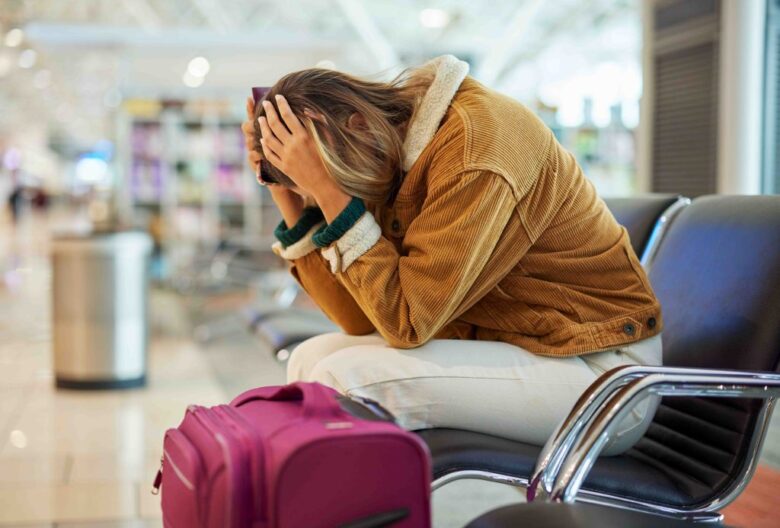Traveling is fun; you can see new things and make memories that will last a lifetime. But even the best-laid plans can go awry. A delayed flight, a lost passport, an unexpected illness, or a natural disaster can make a perfect trip impossible. When something goes wrong, our response is more important than the problem itself. By staying calm, understanding the situation, and taking initiative, you can turn a tragedy into a manageable situation or even an anecdote worth sharing.
In this tutorial, we provide practical and efficient tips on how to politely deal with travel problems. Whether you are dealing with a medical emergency or a legal problem abroad, we do our best to make your trip as smooth as possible. Whether you are a frequent flyer or a first-time traveler, knowing how to respond when problems arise is your best travel companion.
Flight Cancellations and Delays: Know Your Rights and Act Quickly
People get very angry when flights are delayed or cancelled. But knowing your rights as a passenger can help you the most. When flights are delayed or cancelled for a long time, airlines usually offer compensation or the possibility of rebooking. This is especially important under EU regulation EC261/2004 or similar rules in other countries. If you run into problems, always go straight to the airline counter to ask about rebooking options. If you need food or accommodation, ask for a voucher. Keep all receipts, documents, and boarding passes. You may need these for a refund. Check your travel insurance immediately to see if the extra costs are covered. Apps such as FlightAware and Flightradar24 can help you stay informed about such situations, and AirHelp can help you claim compensation.
Lost or Stolen Passport: Secure Identity and Report Immediately
Losing your passport while traveling abroad can be very upsetting. But the first step is to immediately inform the police and your embassy or consulate of your loss. Always carry electronic and paper copies of your passport, visa, and identification documents. If your belongings are stolen, you should report it to the police so that the embassy can process it and apply for travel insurance. If you need an emergency travel document or temporary passport, go to the nearest embassy with your ID, passport photos, and travel plans. Some embassies can provide documents within 24 to 48 hours, but specific times and appointments may vary, so don’t delay.
Medical Emergencies Abroad: Prioritize Health and Communication
If you get sick or injured while traveling, your condition can deteriorate quickly if you are not prepared. Go to the nearest clinic or hospital for help first. If you are unsure about the reliability of a local company, consult your embassy or hotel concierge in your country. Always carry a list of your allergies, medical conditions, and emergency contacts with you while traveling. It is essential to have travel insurance with medical coverage. This insurance covers medical expenses and usually includes a 24/7 emergency hotline. Some insurance companies also offer emergency evacuation services. If you speak another language, you can use a translation app to describe your symptoms. Also, save local emergency numbers in your phone. If you are taking medication, ask your doctor for an English translation of the prescription in case you need further treatment.
Natural Disasters and Political Unrest: Go to a Safe Place and Stay Informed
Natural disasters, strikes, and civil unrest can happen unexpectedly, especially in areas where these events are common. It is imperative to choose safe accommodation, avoid dangerous places, and consult official sources such as government websites or travel advisories from the U.S. Department of State. For immediate information, you can subscribe to local alerts or enable location-based notifications on your phone. Stay away from protests and rallies, as the situation can quickly escalate. In the event of an emergency, your embassy is your first port of call. They can help you leave the country, get emergency funds, or get home. Before you leave, it is best to register your trip with the government travel planner so they can contact you in case of an emergency.
Scams and Theft: React Quickly and Tell Others
Travel fraud can be as simple as expensive taxi rides and fake travel guides or as serious as credit card fraud and theft from your accommodation. If you are a victim of a scam or theft, call the police immediately and inform your embassy. If your credit card is stolen, block it immediately and inform your bank of all transactions. You can transfer emergency money to your home using services such as Western Union or Wise. If you lose money, some travel insurance policies can help you obtain replacement documents or emergency credit cards. Be careful when using public Wi-Fi, ATMs, and shopping on the street. Don’t talk to strangers who are overly friendly and offer help or services without being asked. The best way to stay safe is to lock your doors, hide valuables, and keep spare cards and cash separate.
Accommodation Problems: Stay Connected with Smart Tools
Accommodation issues like double bookings, unexpected charges, or dirty conditions can make you feel uncomfortable. First, take a photo or video of the problem and give it to management in a polite but forceful manner. If you booked through a website like Booking.com or Airbnb, contact their customer service to ask how to get a refund or change your room. Many websites have 24-hour helplines to help travelers with problems. Make sure to take screenshots of your booking confirmation and any messages you send to the host. Use a secure payment method, like a buyer protection credit card, where possible. If you need to change rooms immediately, try apps like HotelTonight or Hostelworld to find other places to stay in your area.
Communication Issues: Use Smart Tools to Stay Connected
Getting lost or facing a language barrier can be lonely. Most communication barriers can be overcome with technology. Before you go, download a translation tool like Google Translate and an offline map like Google Maps or Maps.me. To stay connected, choose a local SIM card or an international data plan. Knowing a few key local phrases or using a translation tool like Pocketalk can be helpful in an emergency. If you get lost in a city, go to a public place like a hotel, police station, or large store. There are usually people who speak English or are willing to help. Save important information, like embassy phone numbers and travel plans, in your phone’s notes or cloud storage so you can access it offline.
Emotional Stress and Mental Health: Take Care of Yourself First
Travel stress can be overwhelming, especially when things don’t go your way. It’s normal to feel stressed or anxious. Take a break to drink some water, get some fresh air, and collect your thoughts. Stay in touch with friends and family. Hearing familiar voices can help you feel more grounded. Meditation, journaling, or listening to relaxing music can help you feel less anxious. If you are experiencing significant emotional pain, feel free to reach out to a local mental health professional or seek out online therapy. Remember that taking care of your mental health is just as important as solving problems.
Conclusion:
Traveling is always full of uncertainties. Things may not always go smoothly; you may miss your flight or have a medical scare. But travel setbacks don’t have to ruin the entire trip. With the right tools, knowledge, and attitude, we can overcome setbacks with confidence and strength. Always have a backup plan, such as copies of important documents, extra cash, insurance, and a few helpful apps. Most importantly, stay calm, think clearly, and make decisions quickly. How you respond is more important than the situation itself. Turn mistakes into lessons and make them part of your journey. Even when the unexpected happens, the world is full of kind strangers, support networks, and second chances.
FAQs:
1. What is the first thing I should do if I lose my passport while I am away from home?
Immediately call the nearest embassy or consulate and report it to the police in your area. Bring all your travel documents, ID, and photos.
2. Does travel insurance cover medical problems and trip cancellations?
Yes, most comprehensive travel insurance policies cover both, including hospitalization, trip cancellation due to illness, and sometimes even lost items.
3. How can I stay safe during political unrest or natural disasters in other countries?
Stay indoors, stay away from crowds, and follow the instructions of local officials or embassies. Sign up for your government’s official travel alert service and let them know where you are going.
4. What if I get robbed or scammed while traveling?
Tell your local police and embassy, block stolen bank cards, and contact your insurance company for help arranging compensation or changing your insurance.
5. Can I get a refund if my flight is canceled?
Yes, but this depends on the airline and country regulations. Keep all receipts and documents in case you need to file a claim or seek assistance.




